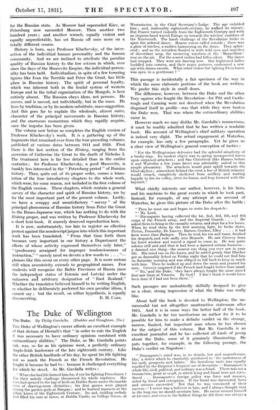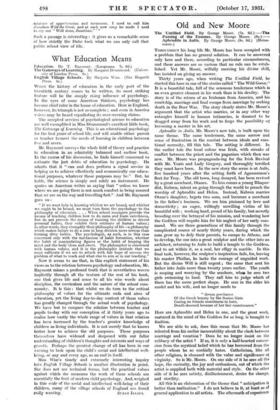The Duke of Wellington
The Duke. By Philip Guedalla. (Hodder and Stoughton. 25s.)
TILE Duke of Wellington's career affords an excellent example of that dictum of Disraeli's that " in order to rule the English it was necessary to have ordinary opinions combined with extraordinary abilities." The Duke, as Mr. Guedalla points out, was, so far as his opinions went, a perfectly ordinary Anglo-Irish landowner of the late eighteenth century. Like the other British landlords of his day, he spent his life fighting not so much the French as the French Revolution. He fought it because he had to : because it challenged everything for which lie stood. As Mr. Guedalla writes : " What else had life formed him for, if not for fighting Frenchmen ? For their unholy challenge threatened his whole tradition. His eyes had opened to the tap of heels on Dublin floors under the marble eyes of drawing-room divinities ;. his first games were played among the garden gods at Dangan ; and he learned manners at the silken knees of 'the Eighteenth Century. Its sad, tinkling melody had filled his ears at home, at Dublin Castle, on College Green, at
Westminster, in the Chief Secretary's Lodge. The age enfolded him ; and, inalterably eighteenth-century, he walked its minuet. But France turned violently from the Eighteenth Century and with an impious hand waved Europe on towards the witches' cauldron of the Nineteenth. The harsh challenge of the Revolution broke in upon the ordered dance. Hoarse voices called outside ; there was a glare of torches, a sudden hammering on the doors. They splint- ered ; and as the intruders flooded in with wild eyes and snatches of discordant song, the mounting numbers of the Marseillaise' rose on the air. For the scared violins had fallen silent. The dance had stopped. They were not dancing now. But frightened ladies huddled into corners, and their angry partners confronted a new age with drawn swords. What other course but fighting Frenchmen was open to a gentleman ? "
This passage is incidentally a fair specimen of the way in which the more elaborate portions of the book are written. We prefer this style in small doses.
The difference, however, between the Duke and the other Tory squires who fought the Revolution—for Pitt and Castle- reagh and Canning were not deceived when the Revolution disguised' itself in profile—was that while they were beaten the Duke won. That was where the extraordinary abilities came in.
However much we may dislike Mr. Guedalla's mannerisms, it must be readily admitted that he has written a readable book. His account of Wellington's chief military operation is indeed very slight. The actual engagement at Waterloo, for example, has only a few paragraphs. Yet he gives us a clear view of Wellington's general conception of tactics :
" For the Wellingtonian defensive had the splendid simplicity of a booby-trap. Its modest object was to spring unsuspected forces upon surprised attackers ; and San Christoval (like Busaco before it and Waterloo a few years later) was admirably suited to this simple pleasantry. The attackers would pant uphill towards the blind skyline ; somewhere behind the crest a line of British infantry would crouch, completely sheltered from artillery and waiting happily to fire its volley, utter its huzza, and leap forward with the bayonet."
What chiefly interests our author, however, is his hero, and his reactions to the great events in which he took part. Instead, for example, of any attempt at an account of Waterloo, he gives this picture of the Duke after the battle :
" Then he went out and began to write his despatch : " My Lord, " Buenaparte having collected the lat, 2nd, 3rd, 4th, and 13th corps of the French army, and the Imperial Guards . . . .' He asked them to bring in the casualty returns, and slept for a few hours. When he read them by the first morning light, he broke down. Picton, Ponsonby, De Lancey, Barnes, Gordon, Elley . . . . it had been worse than Badajoz. Then he took his tea and toast, finished his despatch, and rode sadly into Brussels. He saw Creevey from his hotel window and waved a signal to come in. He was quite solemn still and said that it had been a damned serious business—.a damned nice thing—the nearest run thing you over saw in your life. His mind ran on the losses, and he added grimly that Blucher got so damnably licked on Friday night that he could not find him on Saturday morning and was obliged to fall back to keep in touch with him. Then he walked up and down the room and praised his men. Creevey enquired if the French had fought better than usual. " No,' said the Duke, they have always fought the same since I first saw them at Vimeiro. By God I don't think it would have been done if I had not been there.' "
Such passages are undoubtedly skilfully designed to give us a clear, strong impression of what the Duke was really like.
About half the book is devoted to Wellington, the un- successful but not altogether unattractive statesman after 1815. And it is in some ways the better half of the book. Mr. Guedalla is far too meritorious an author for it to be possible for him to make a definite verdict on the strange, narrow, limited, but important man whom he has chosen for the subject of this volume. But Mr. Guedalla is an excellent journalist and he has collected all kinds of gossip about the Duke, some of it genuinely illuminating. He puts together, for example, in the following passage, the Duke's verdict on Napoleon :
" `Buonaparte's mind was, in its details, low and ungentleman. like,' a defect which he charitably attributed to ' the narrowness of his early prospects and habits.' His fastidious taste was equally repelled by the Emperor's frequent use of deception= Buonaparto's whole life, civil, political, and military was a fraud. There was not a transaction, great or small, in which lying and fraud were not intro- duced . . . Buonaparte's foreign policy was force and menace, aided by fraud and corruption. If the fraud was discovered, force and menace succeeded.' Not that he was convinced of their success—' I never was a believer in him, and I always thought that in the long run we should overturn him. He never seemed himself at his ease, and even in the boldest things he did there was always a mixture of apprehension and meanness. I used to call him Jonathan Wild Me Great, and at each new coup he made I used to cry out " Well done, Jonathan." ' "
Such a passage is interesting : it gives us a remarkable sense of how strictly the Duke took what we can only call that public school view of life.







































 Previous page
Previous page